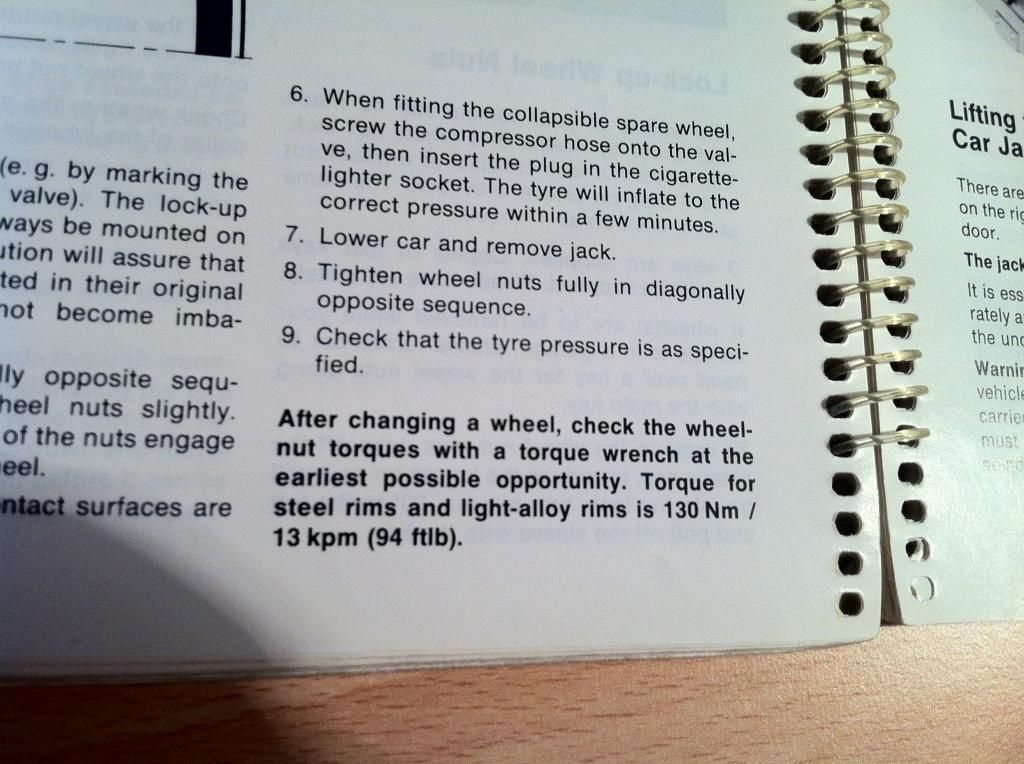Should wheel bolts be fully tightened by air or by hand?
Discussion
at work (main dealer) 2 of the mechanics buzz them then put the torque wrench on which clicks as soon as its touched! I hate this, for me its air gun to remove then screw them up by hand and tighten with torque wrench. i was taught that only reason a air gun goes both ways is for loosening left hand threaded bolts/nuts.
Rob
Rob
BritishRacinGrin said:
xxChrisxx said:
It cracked because you jumped on it, get a longer lever next time. You can apply the torque without the shock load.
Always a torque wrench with cleaned and lubed threads.
Can of worms opened. You'll get mixed opinions on this but in my opinion, unless the handbook specifically mentions it, wheel bolts / studs shouldn't be lubricated. Lubricating them will cause much higher tensile load for a given tightening torque. Personally I lubricate hub flanges but not wheel bolts / studs. Always a torque wrench with cleaned and lubed threads.
Mave said:
BritishRacinGrin said:
xxChrisxx said:
It cracked because you jumped on it, get a longer lever next time. You can apply the torque without the shock load.
Always a torque wrench with cleaned and lubed threads.
Can of worms opened. You'll get mixed opinions on this but in my opinion, unless the handbook specifically mentions it, wheel bolts / studs shouldn't be lubricated. Lubricating them will cause much higher tensile load for a given tightening torque. Personally I lubricate hub flanges but not wheel bolts / studs. Always a torque wrench with cleaned and lubed threads.
doogz said:
motco said:
foot-pounds (ft.lb) is a measure of work, whilst pound-foot (lb.ft) is a torque figure or moment. Therefore they are not the same.
They are exactly the same. 1 ft.lbf is exactly the same thing as 1 lbf.ft. Multiplication of scalars is commutative so lb.ft == ft.lb.
Multiplication of scalars is commutative so lb.ft == ft.lb. However, the same unit combination is also used as a measure of energy, being the energy required to raise a weight of one lb through a height of one foot at sea level. By convention, the torque is written lb.ft and the energy unit is written ft.lb. I've never actually seen anyone use the unit of energy, mind.
Edited by kambites on Friday 20th June 08:24
BritishRacinGrin said:
...in my opinion, unless the handbook specifically mentions it, wheel bolts / studs shouldn't be lubricated.
Definitely. Follow the handbook - that's the state the wheel joint was in when it passed the manufacturer's durability testing, and only an idiot deviates from the only known data set for a safety critical part.BritishRacinGrin said:
... Personally I lubricate hub flanges but not wheel bolts / studs.
Good greif! You should follow the advice in the hand book like the chap above, lets hope you two never have to work on a car together.Edited by Captain Muppet on Friday 20th June 09:24
There is no lubricant known to man which causes friction to cease to exist. I'll volunteer that a bit of copaslip on the flanges to prevent the wheels from welding themselves on will not have a detrimental effect on the fastening provided the fixings are done up right.
Cue a chorus of "So YOU think you know better than the manufacturers?"...
(I was aware that there are conflicting opinions on this too, hence my saying "personally, I...")
Cue a chorus of "So YOU think you know better than the manufacturers?"...
(I was aware that there are conflicting opinions on this too, hence my saying "personally, I...")
BritishRacinGrin said:
There is no lubricant known to man which causes friction to cease to exist. I'll volunteer that a bit of copaslip on the flanges to prevent the wheels from welding themselves on will not have a detrimental effect on the fastening provided the fixings are done up right.
Cue a chorus of "So YOU think you know better than the manufacturers?"...
(I was aware that there are conflicting opinions on this too, hence my saying "personally, I...")
Causing friction to cease to exist isn't the same thing as vastly reducing it though, which is what lubricants do. Personally i have always found that removing the wheels for brake maintenance/check each year has been enough to prevent any corrosion welding problems of the wheels, also has the benefit of making sure the brakes are functioning correctly such as slide pins are lubed and not stuck, rubbers are in good condition and pads are still appropriate thickness.Cue a chorus of "So YOU think you know better than the manufacturers?"...
(I was aware that there are conflicting opinions on this too, hence my saying "personally, I...")
The big problem i would expect from copper grease on the hub is the possibility of getting it on the threads resulting in over tightening and/or the possibility of them coming loose with the added problem of reduced friction between the wheel and hub making the studs subject to increased forces. Yeah 9 times out of 10 it will be fine, but why increase the risk.
Edited by ViperDave on Friday 20th June 11:34
I'm surprised that more garages on't have a torque limiter set, which uses a complicated and very cool spring thing to limit the torque that can be put onto the bolt, I think the guy who does our stuff has a set of 4 and uses the nearest lower spec to whats needed and nips it up with a wrench. Much quicker on wheels with lots of studs! I think they fit a 3/4 or 1" impact gun.
Gassing Station | General Gassing | Top of Page | What's New | My Stuff





